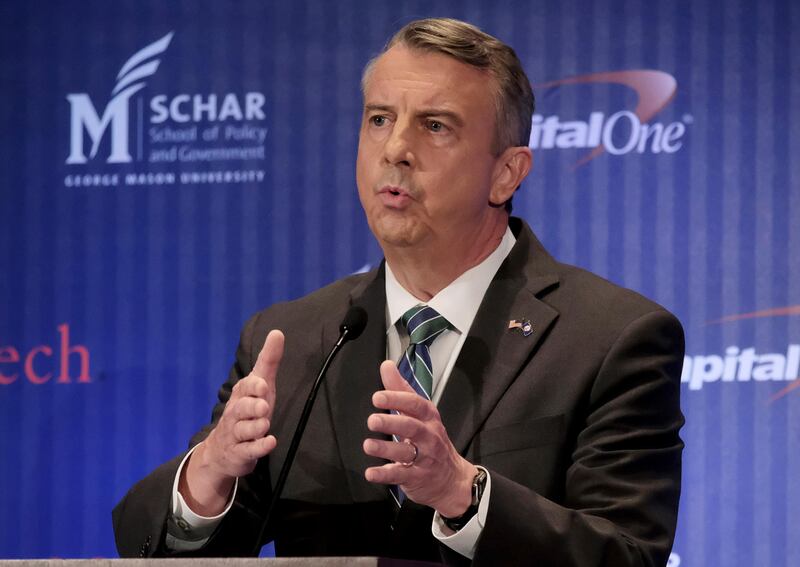Next week’s election in Virginia has national and international significance that is largely unrecognised, especially outside the United States. But the gubernatorial vote could indicate the future of the Republican Party – and therefore, the trajectory of US policy – in coming years.
And the down-ballot races for the House of Delegates might be a bellwether for the all-important election next year for the national House of Representatives, indicating the prospect of an upheaval of the revived Democratic majority in that chamber.
From the outset of the Donald Trump era, one of the key questions has been whether the president is simply the focus of a personality cult that only applies to him or if he represents a powerful new political trend that can be successfully replicated by very different Republican personalities around the country.
Ed Gillespie, the Republican candidate for the position of Virginia governor, is pioneering a model that, if successful, will likely prove the new template for most future Republican candidates. Mr Gillespie is a veteran and once-centrist Republican who long championed moderation, diversity and an outreach to minorities. But in the Trump era, he has swung sharply to the populist extreme right.
His recent ads equated immigrants with gang members, condemned “sanctuary cities” – of which there are none in Virginia – supported Confederate monuments and blew every possible dog whistle of intolerance and racial bias. In short, Mr Gillespie is experimenting with a blend of traditional and moderate establishment Republicanism injected with enough Trump-infused rhetoric to appeal to a base that seems imbued with cultural and ethnic rage.
_____________________
Read more on Trump administration
[ Donald Trump's Twitter account deactivated by employee leaving company ]
[ Trump nominates Jerome Powell to lead Federal Reserve ]
[ White House slams Russia over veto on Syria chemical weapons probe ]
_____________________
His approach is, sadly, paying off. After months of trailing his Democratic rival, Ralph Northam, Mr Gillespie has now pulled within the margin of error and has a real shot at winning. If he does, his victory will be credited largely to his Trumpian turn and Republican candidates all over the US will tack sharply to the ethno-nationalist right to win elections. In the process, Mr Trump’s conquest of the Republican Party will be consolidated and its dominant narratives transformed for at least a generation.
If Mr Gillespie fails, then the war within the GOP, being led by former Trump chief strategist Steve Bannon, to destroy the existing Republican Party and replace it with a “populist” and essentially white nationalist movement, will intensify and be played out over a longer and more painful period.
If Mr Northam wins, Democrats will feel heartened that Mr Trump’s unpopularity with most Americans has proven a real drag on Republican prospects. But their attention may be even more greatly focused on the Delegates’ election.
These little-known seats in the lower house of the Virginia legislature are miniature versions of the elections that will dominate next year’s national mid-terms. Democrats are hoping to win six new seats. If they can gain 10 or more, it will be the sharpest sign that Democrats might indeed be gaining the momentum in smaller elections in swing districts to have a real shot at regaining a majority in the House of Representatives. Democrats are in no position to gain a majority in the Virginia House of Delegates, which has a Republican majority of more than 30, bolstered by many safely conservative seats and gerrymandered districts. But major gains would indicate they are in a strong position for next year’s national house elections.
_____________________
Read more on the White House in Opinion
[ Trump in the White House: a year in the life of a third-party president ]
[ Why Donald Trump is prepared to ditch the Iran nuclear deal ]
_____________________
If Democrats do regain control over the House of Representatives next year, they would have a total veto over legislation they cannot accept. Perhaps even more significantly, they would acquire the control over house committees and investigative powers to seriously probe an endless array of possible misdeeds by Mr Trump and his associates, ranging from accepting foreign emoluments to collusion with Russia and financial maleficence and self-dealing. They could even impeach Mr Trump for cause, although conviction and removal from office would still be in the hands of a Senate that is likely to remain Republican.
The outcome of the Virginia governor’s race will do much to indicate the trajectory and character of the Republican Party in coming years. And there is no better measure of where next year’s house election is headed than the Virginia Delegates race.
These outcomes have national and international significance. Mr Trump's effectiveness, such as it has been, is tied to Republican control of Congress. He is already embroiled in the Russia investigation led by Robert Mueller and many other damaging controversies. A Democratic house could effectively paralyse his administration, including on foreign policy, through a series of investigations and hearings into the numerous allegations of dubious activities surrounding Mr Trump and his administration.
Should Mr Gillespie prevail, Mr Trump will have clearly stamped his mark on the party and its traditional, and formerly moderate, leaders. A Trump-inflected ideological era in American politics will be decisively at hand and the old Republican Party gone. The world would then be dealing not only with a very different president, but also a very different America.
Hussein Ibish is a senior resident scholar at the Arab Gulf States Institute in Washington, DC





